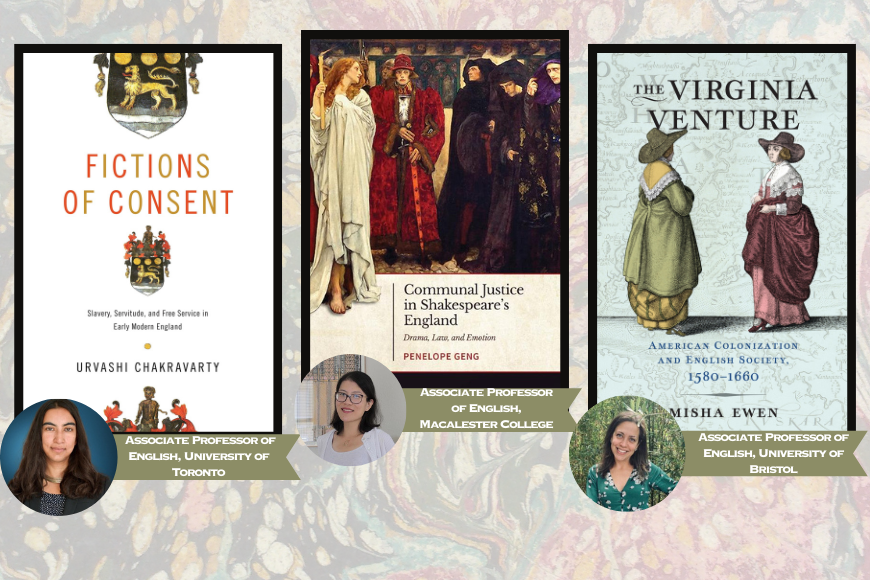Book Panel: "Colonization, Consent, and Community"
*Virtual Event
Excerpts available upon request
About the Panel
This interactive book talk features three recently published authors exploring the surprising overlaps between their books around themes of community, consent, and colonization in early modern England and early America. Each of these three studies considers the powerful influence of ordinary and everyday people on shaping economic, social, and legal processes and norms. What sorts of fictions of race did schoolboys learn in the humanist classroom and how did these fictions help normalize the enslavement of racialized bodies? How were the lives of laboring men, women, and children in England disrupted by the Virginia Company’s colonial ventures in America? What accounts for the prevalence of the character of the lay magistrate in early modern drama and does it have anything to do with the rapid professionalization of the common law? The books are out, but the exciting conversation is just getting started. Join us!
About the Speakers
Penelope Geng is Associate Professor of English at Macalester College, where she teaches courses on early modern literature, Shakespeare, law and literature, and disability. She is the author of Communal Justice in Shakespeare’s England: Drama, Law, and Emotion (2021). Her articles have appeared in Studies in Philology, The Sixteenth Century Journal, The Ben Jonson Journal, Law, Culture and the Humanities, and The Shakespearean International Yearbook: Disability Performance and Global Shakespeare. She is hard at work on her second monograph, provisionally titled Disabled by Law, which explores the deep influence of property law on early modern ideas of racial difference, disability, and able-bodied citizenship. With Jennifer E. Row (UMN), she is the co-convener of Uncommon Bodies (supported by the UMN Center for Premodern Studies). A beginner improviser and serial hobbyist, she lives in St. Paul, Minnesota, USA.
Dr Misha Ewen is a Lecturer in Early Modern History at the University of Bristol where she researches the role of women in colonization and slavery in the seventeenth- and eighteenth-century English Atlantic world. Her first monograph, The Virginia Venture: American Colonization and English Society, 1580-1660, was published by University of Pennsylvania Press in 2022. She has also published articles in The Historical Journal, Gender & History, Cultural and Social History Journal, and Itinerario. Before joining Bristol, Misha was Curator for Inclusive History at Historic Royal Palaces where she co-curated Untold Lives: A Palace at Work, which opens at Kensington Palace in March 2024.
Urvashi Chakravarty is Associate Professor of English at the University of Toronto where she
works on early modern English literature, critical race studies, queer studies, and the history of
slavery. Her first book, Fictions of Consent: Slavery, Servitude, and Free Service in Early
Modern England (Penn Press, 2022), explores the ideologies of Atlantic slavery in early modern
England, revealing the everyday sites where the foundations of racialized slavery were laid.
Fictions of Consent received the Phyllis Goodhart Gordan prize for the best book in Renaissance
studies from the Renaissance Society of America and the First Book Award from the
Shakespeare Association of America and was shortlisted for the Shakespeare’s Globe Book
Award; it was also selected as a Choice Outstanding Academic Title for 2023 and was a finalist
for the Paul E. Lovejoy Prize for ‘excellence and originality in a major work ... on any theme
related to global slavery’ from the Journal of Global Slavery. Chakravarty’s essays and articles
appear in a number of journals and edited collections, and with Ayanna Thompson, she co-edited
a special issue of New Literary History on ‘Race and Periodization’. She is currently writing a
book on the construction of white womanhood in the early modern period and its role in racial
futurity, Atlantic slavery, and the nexus of labour and white property, and is editing
Shakespeare’s A Midsummer Night’s Dream for the Arden Fourth Series. She serves on the
Executive Board of RaceB4Race.
